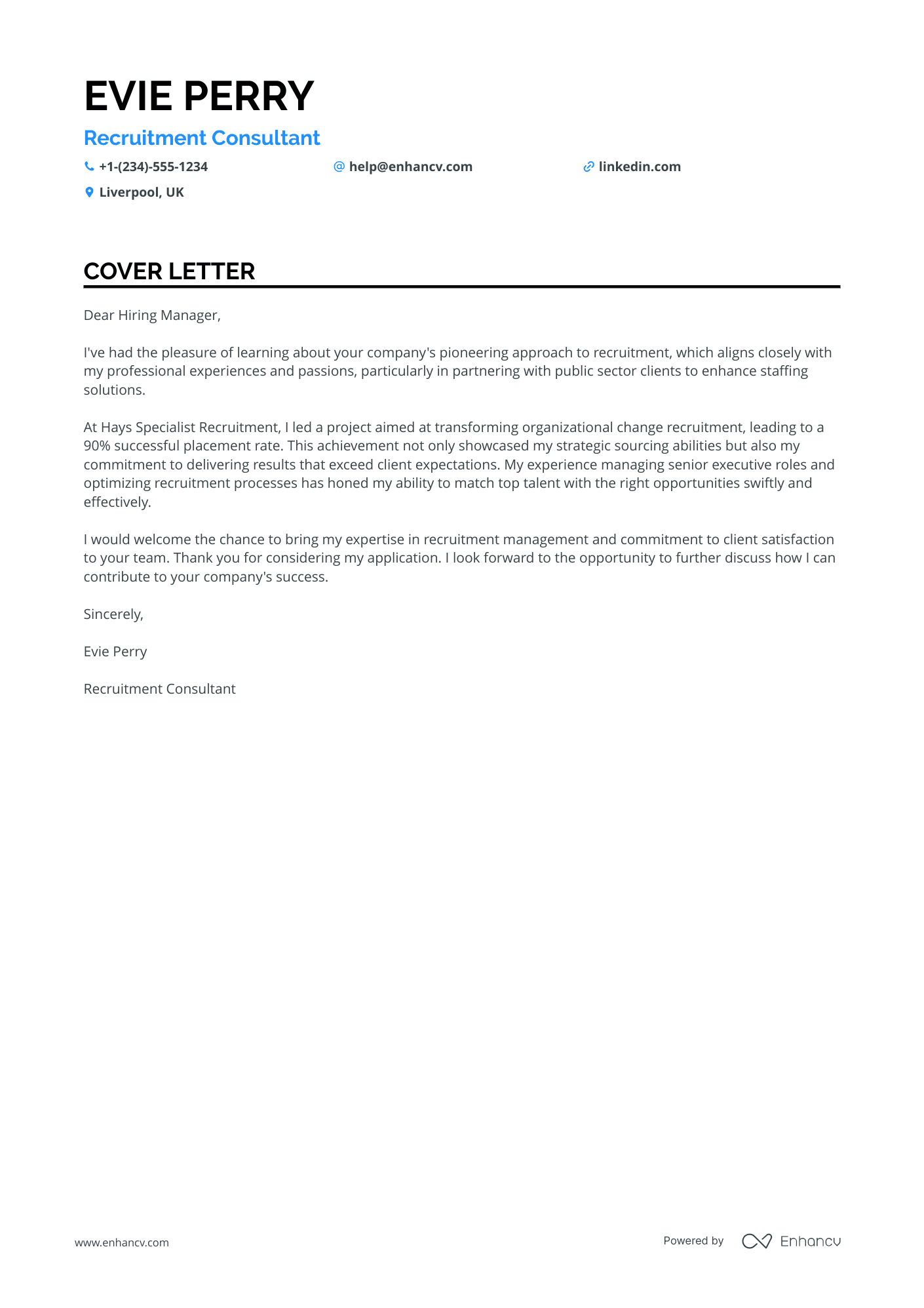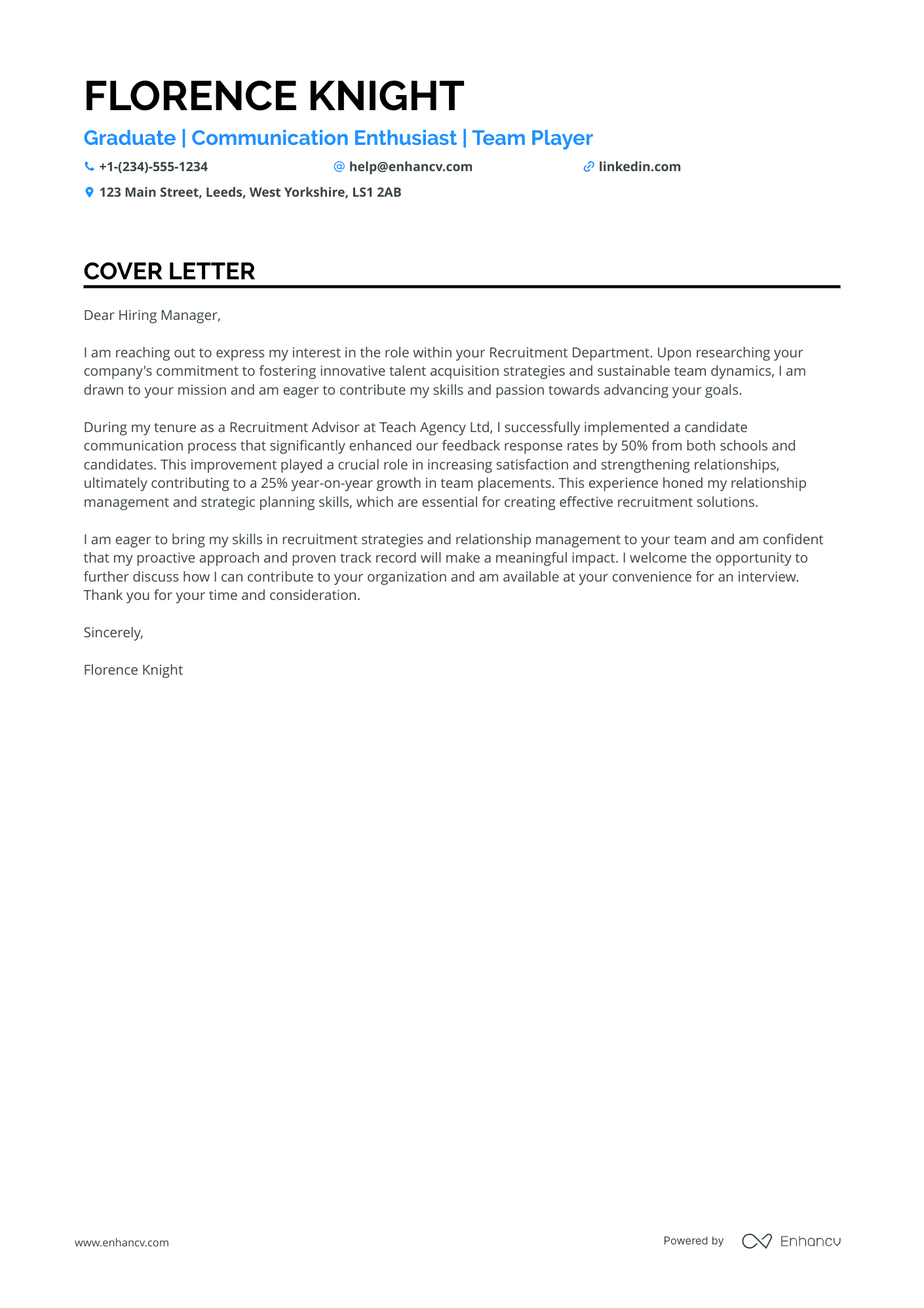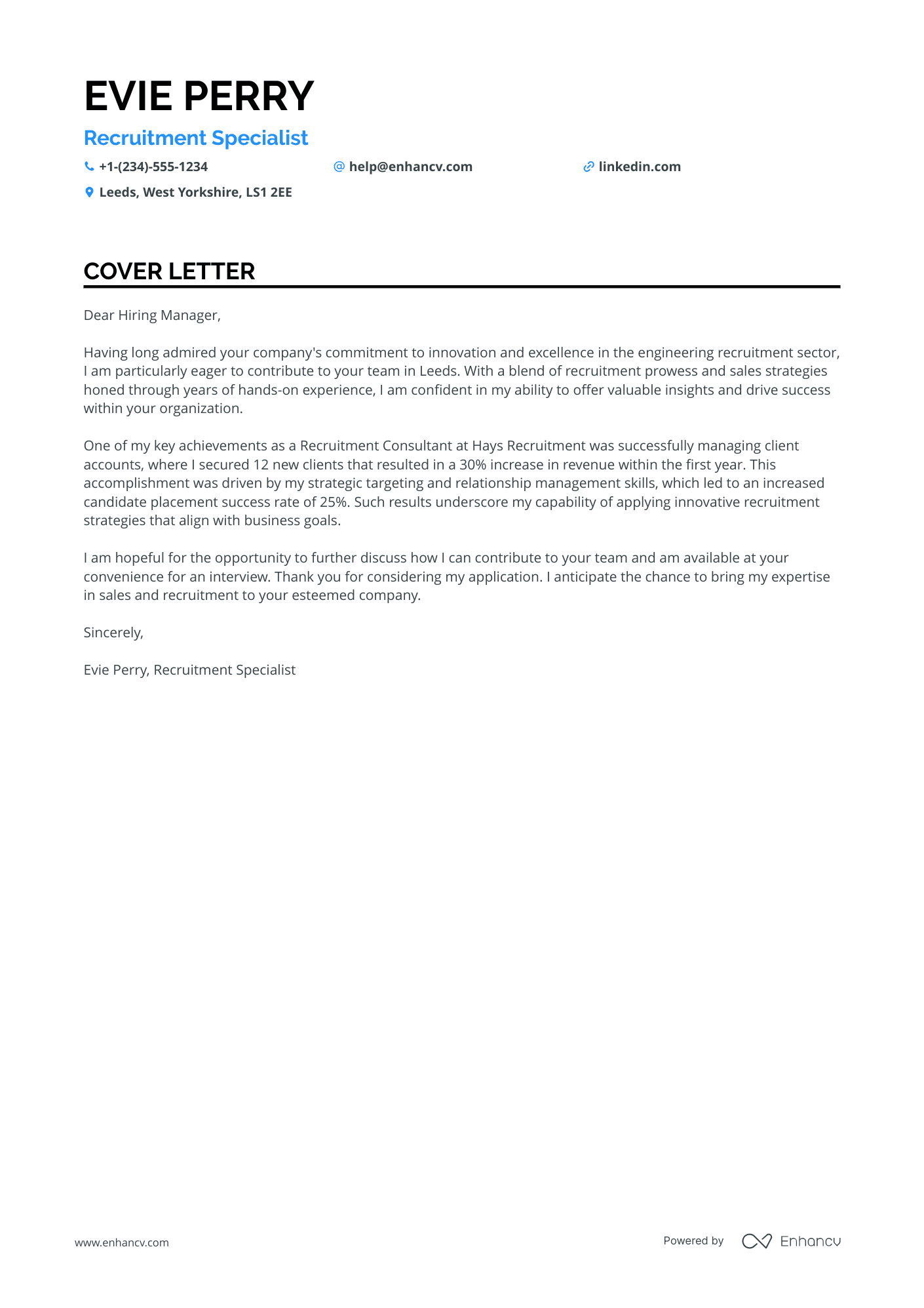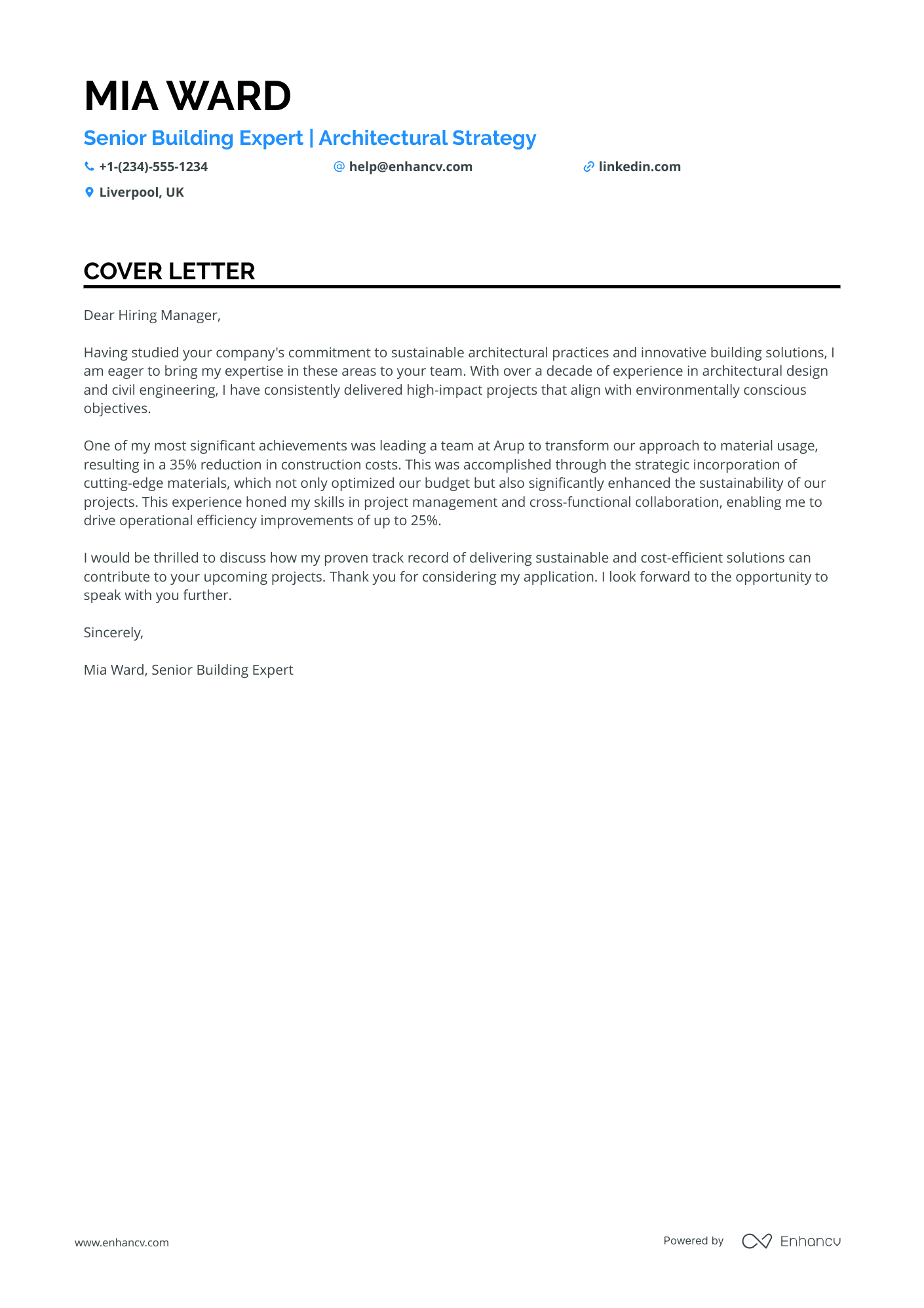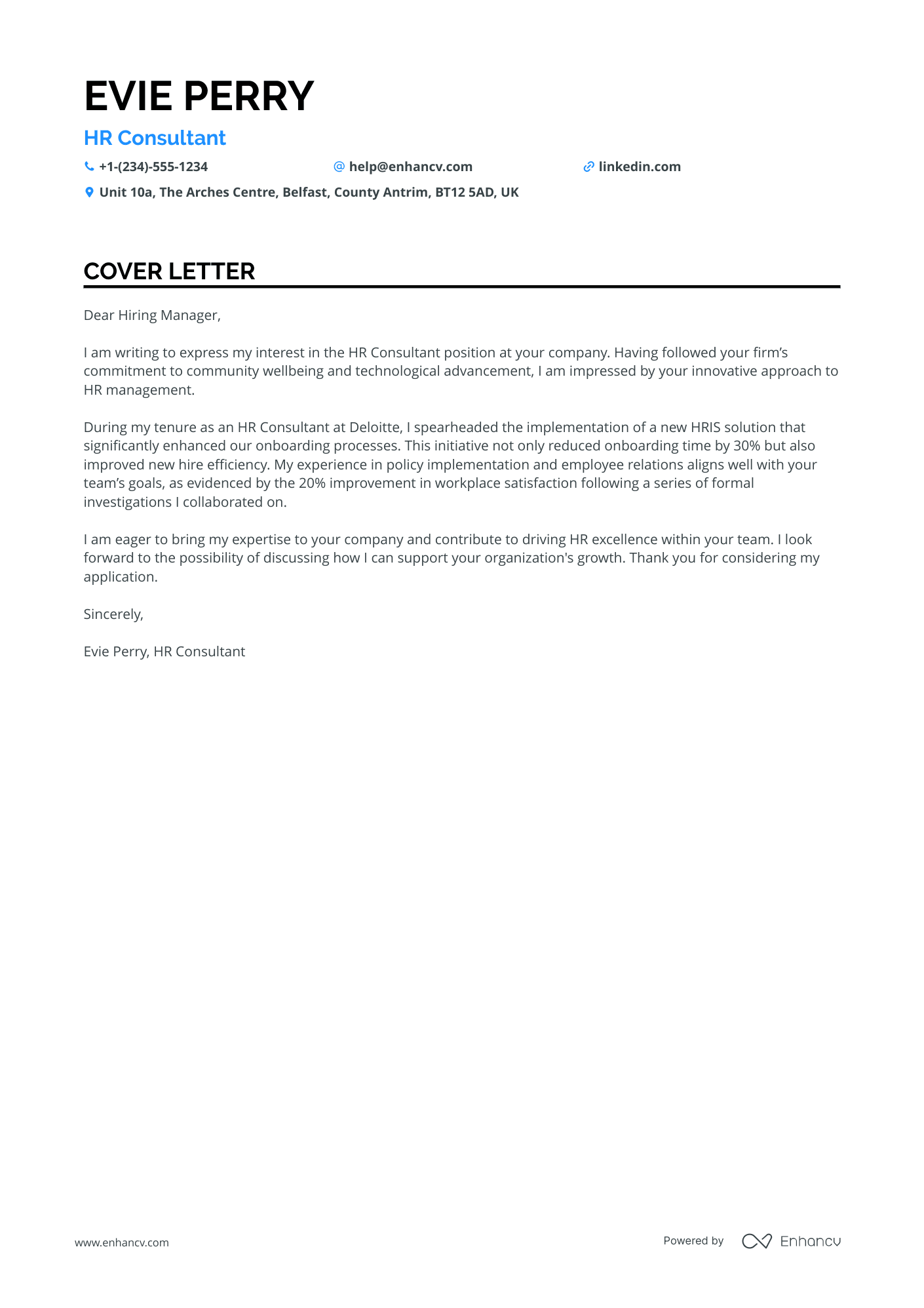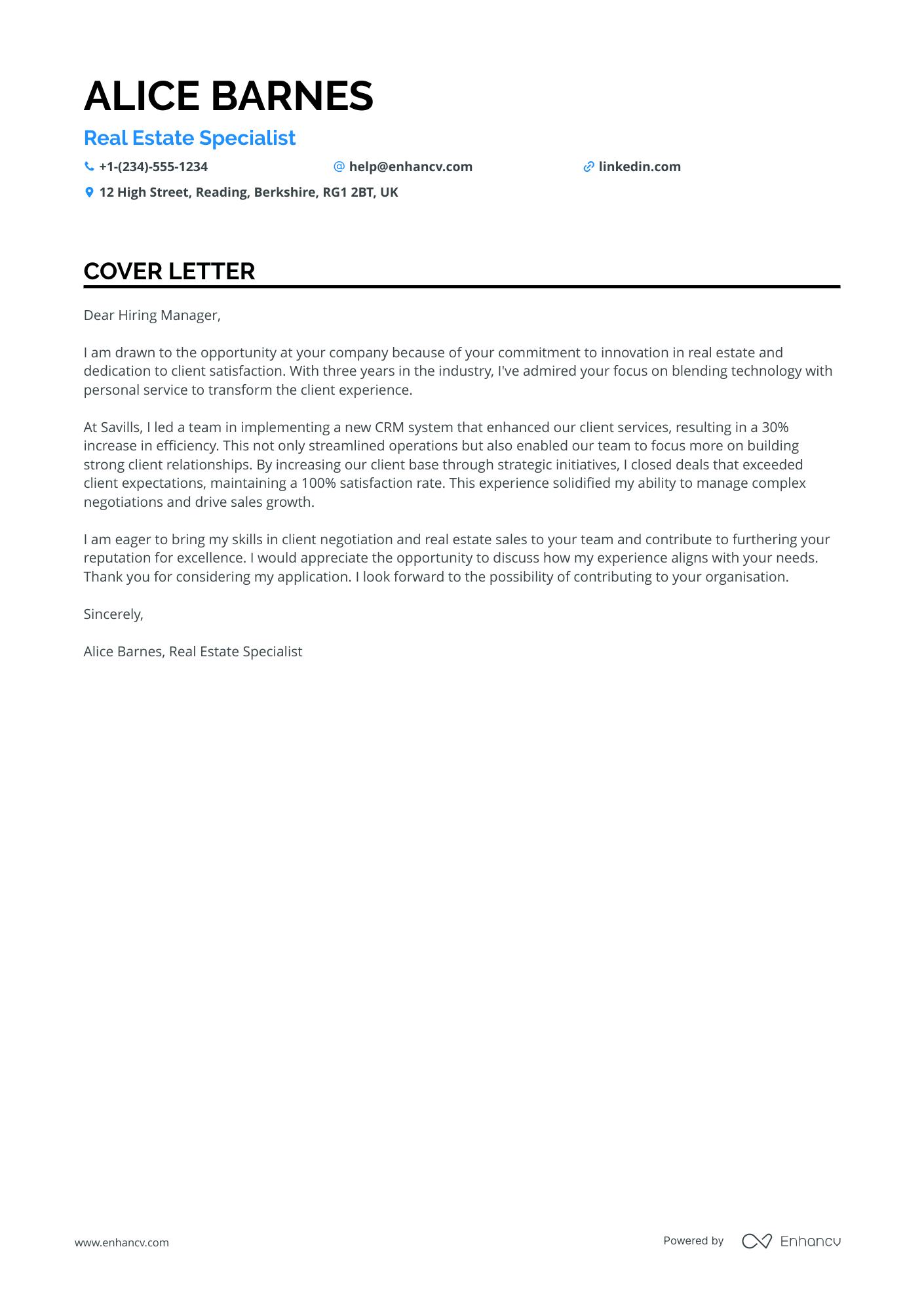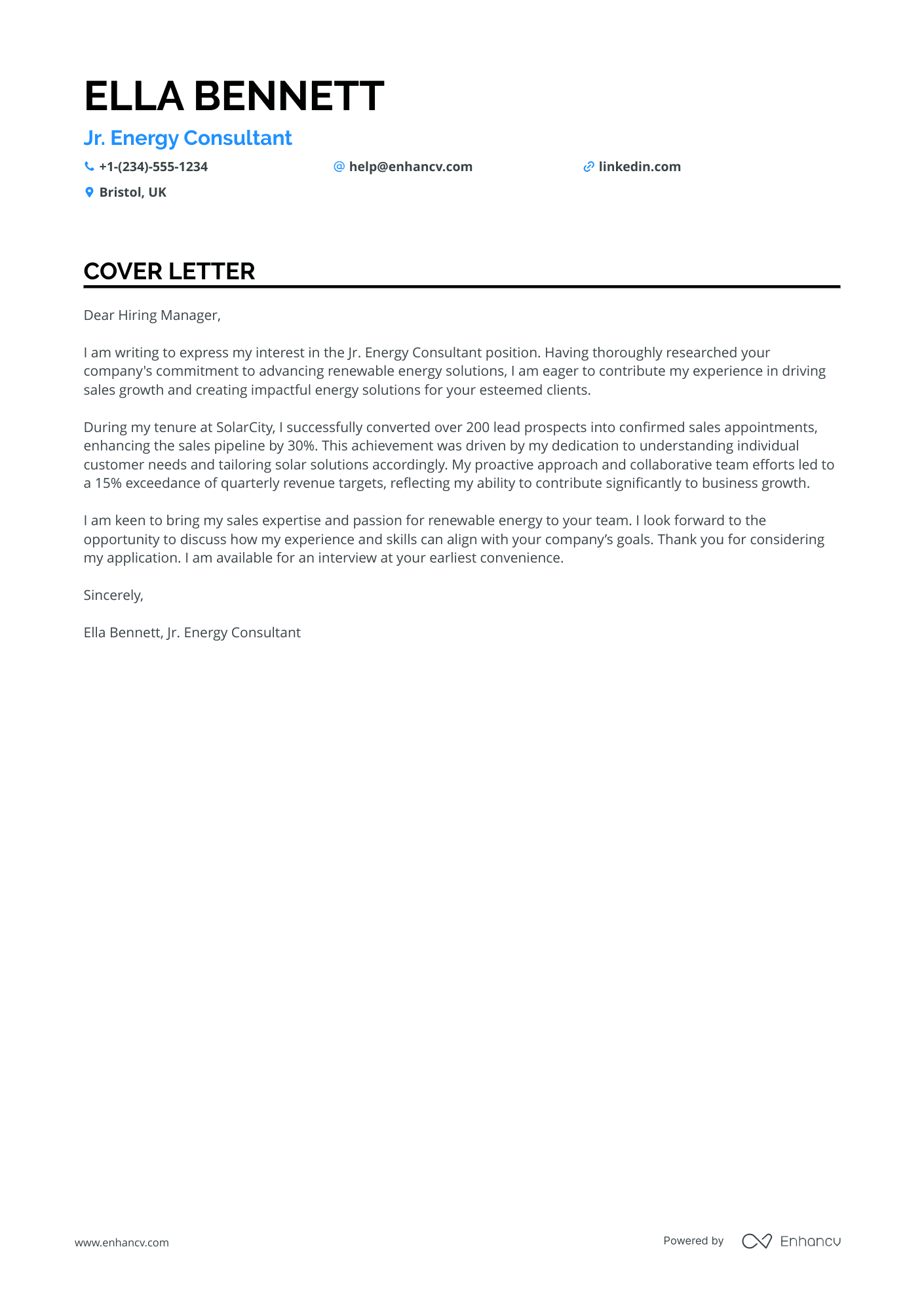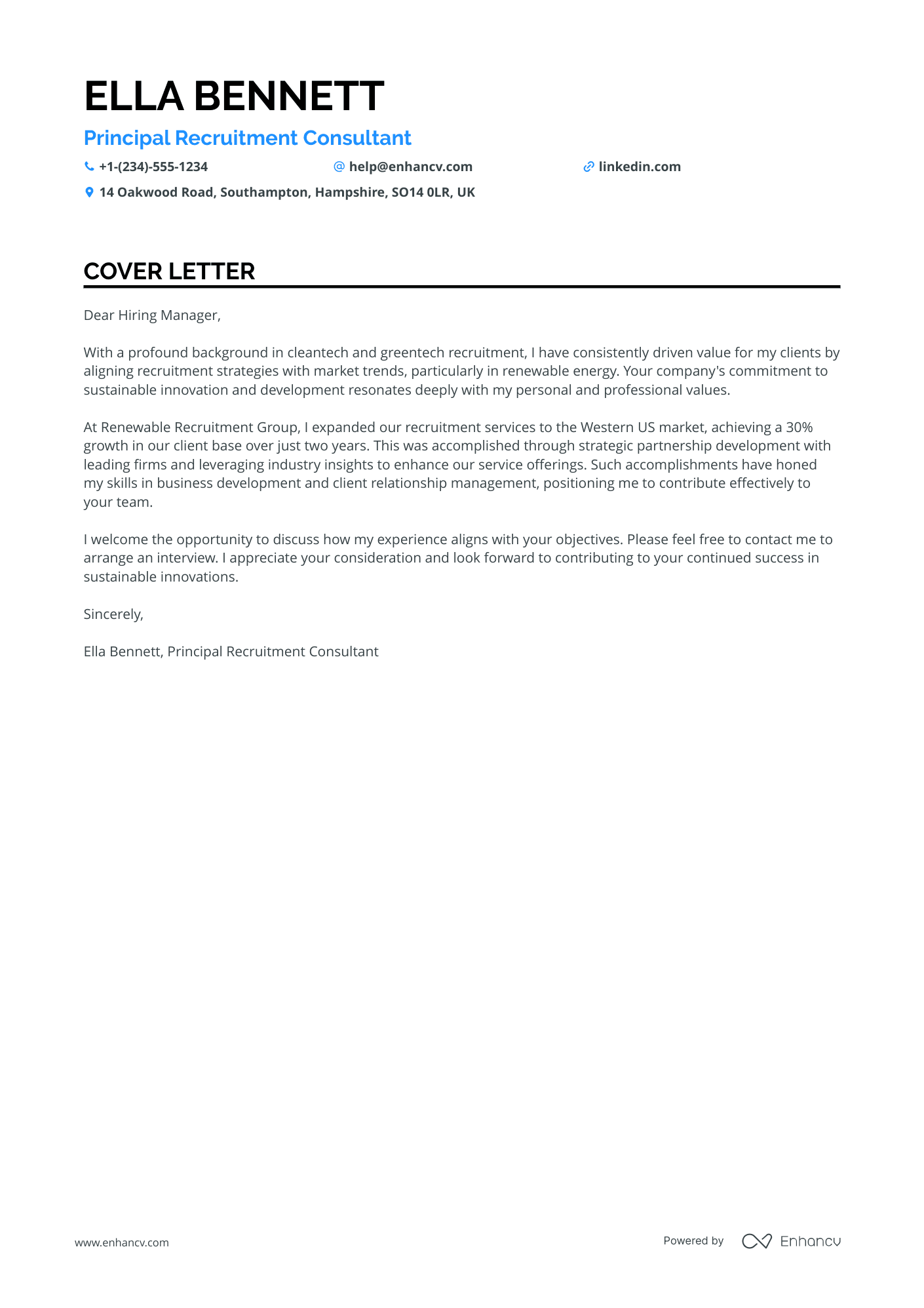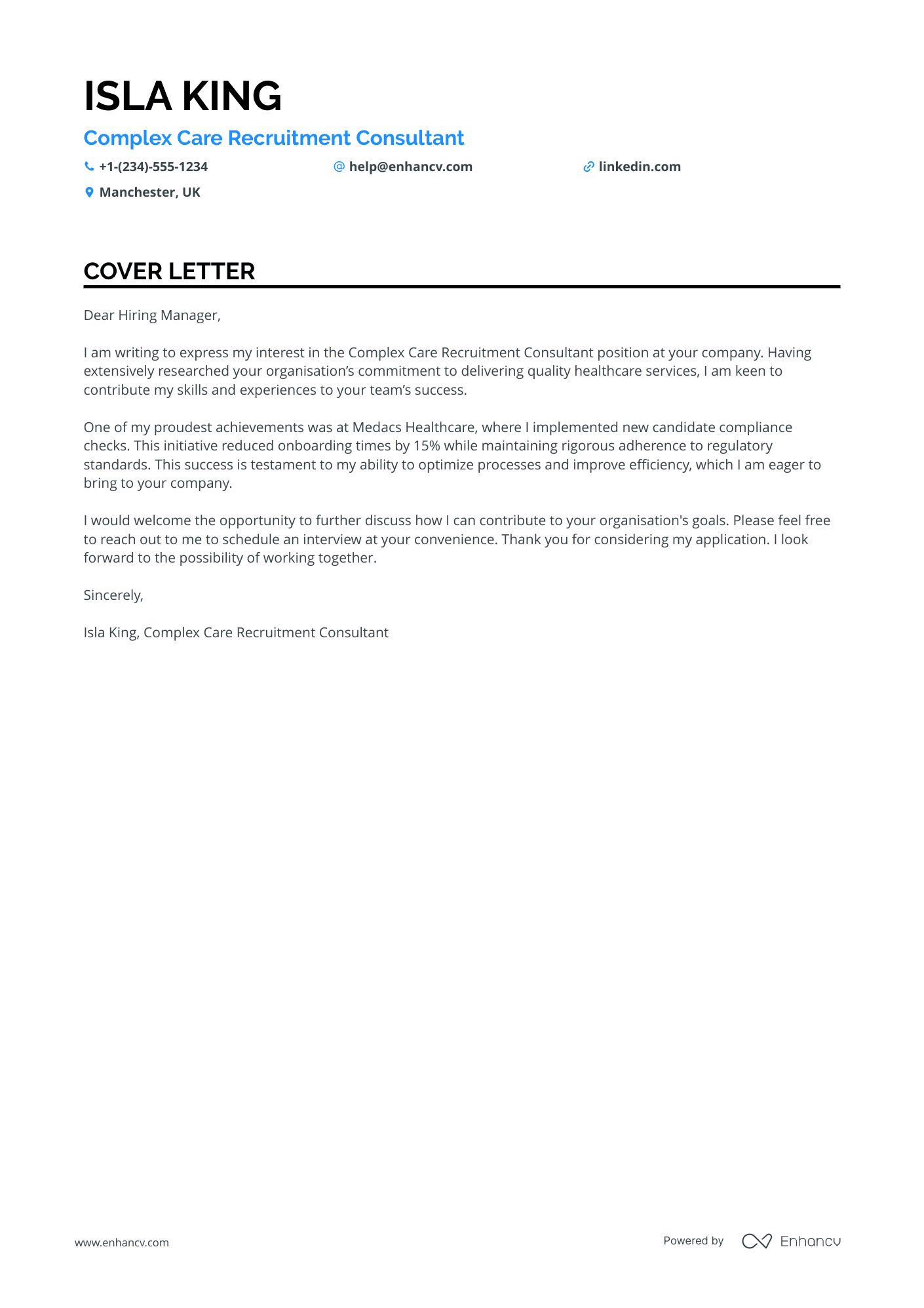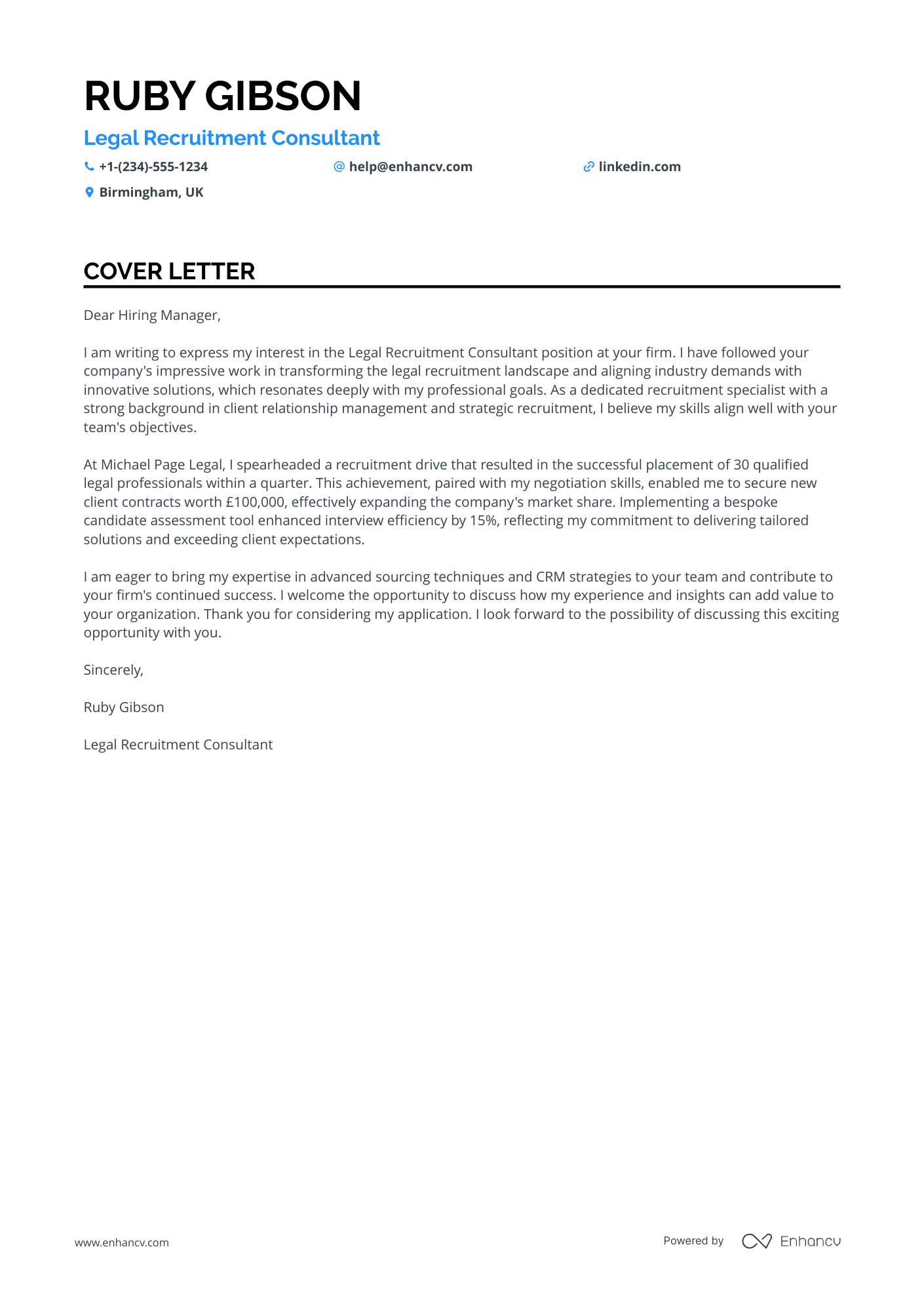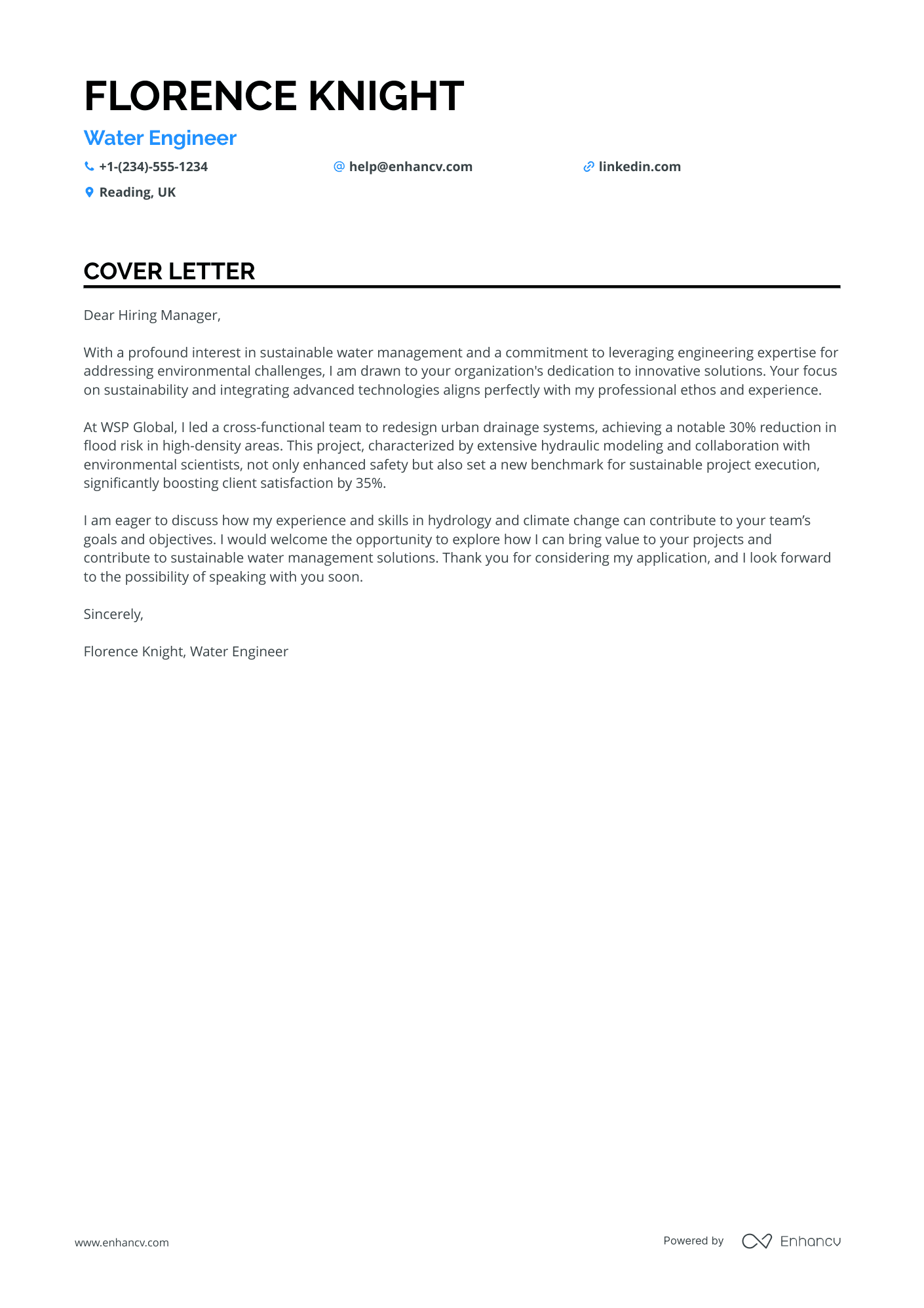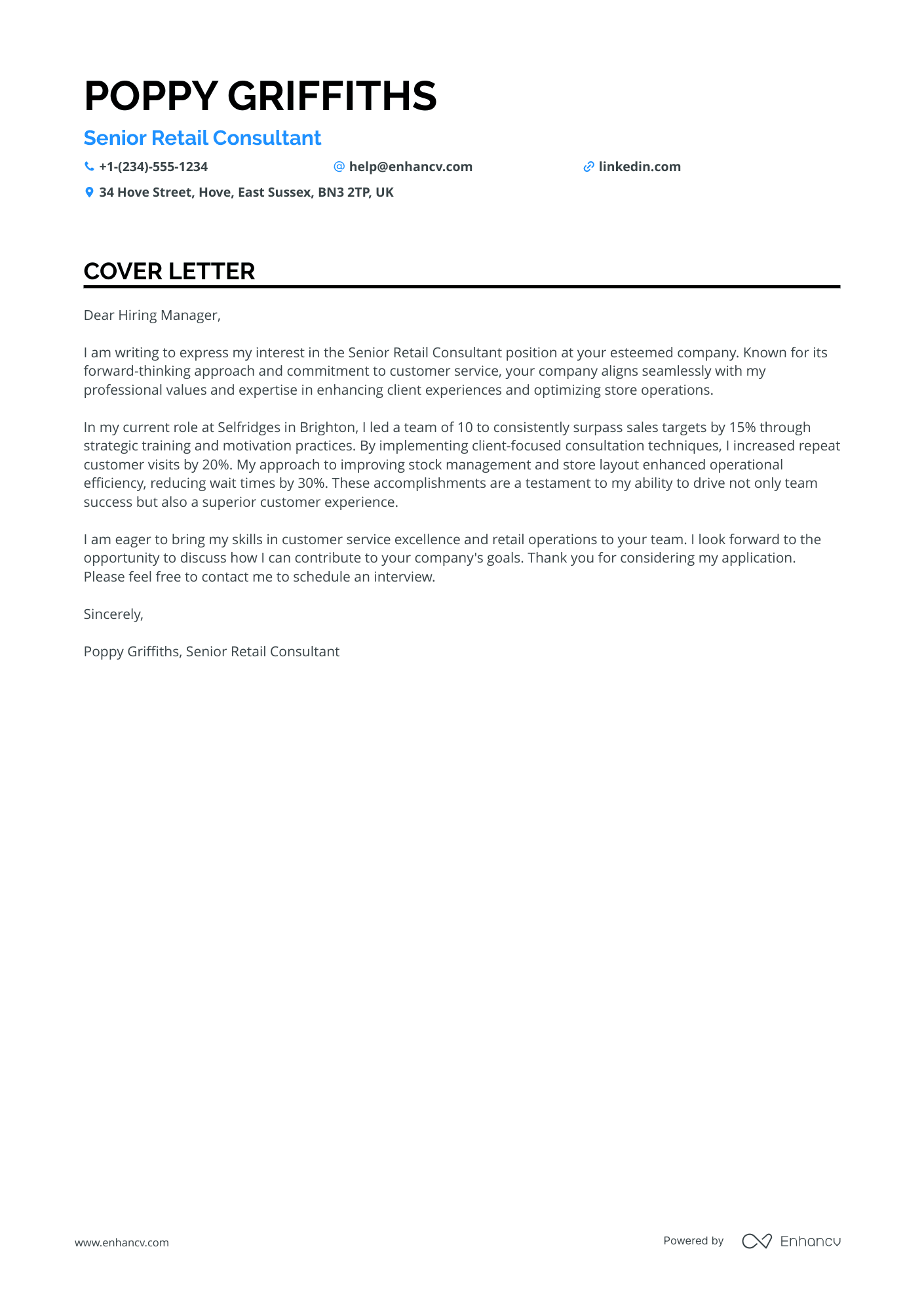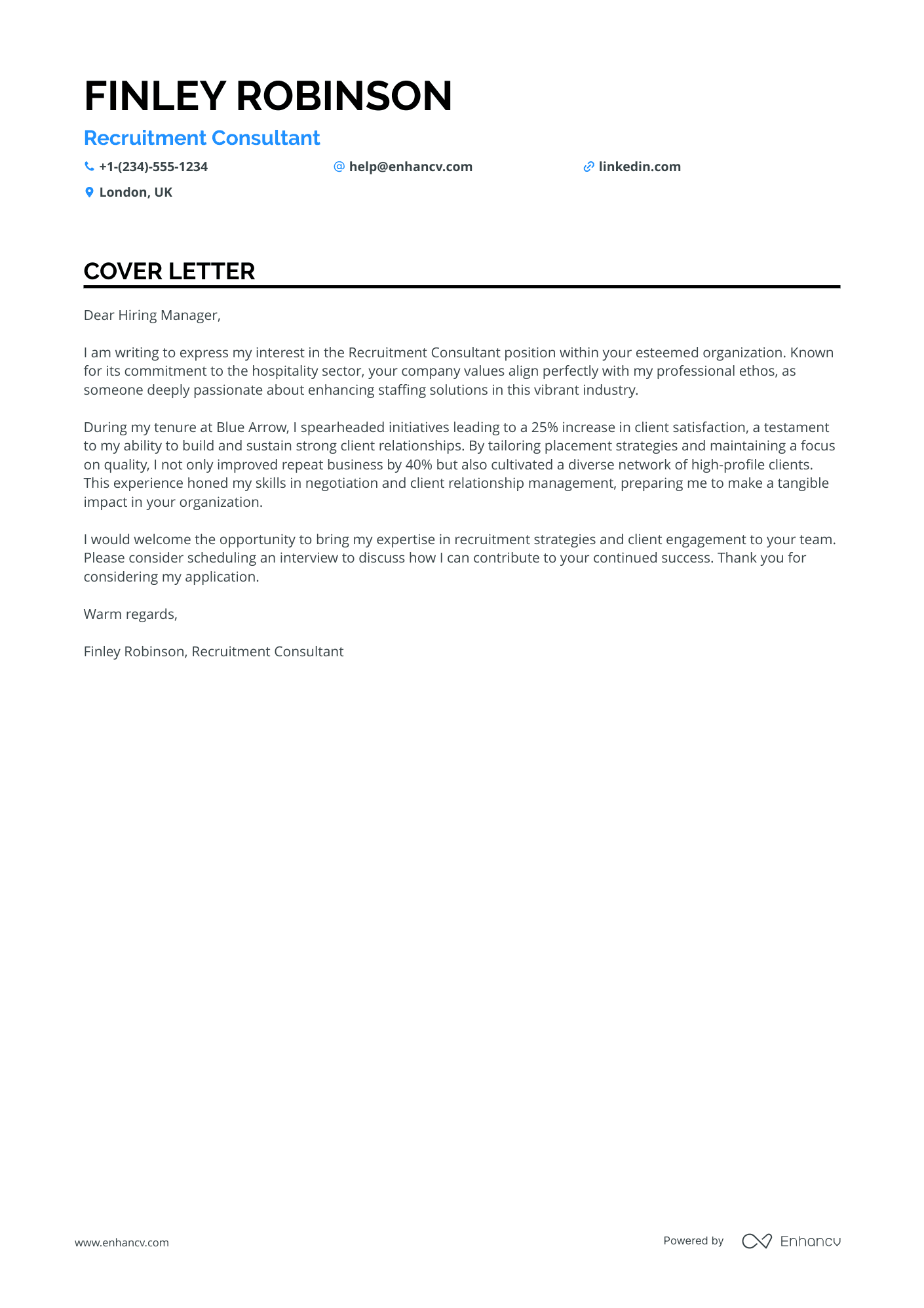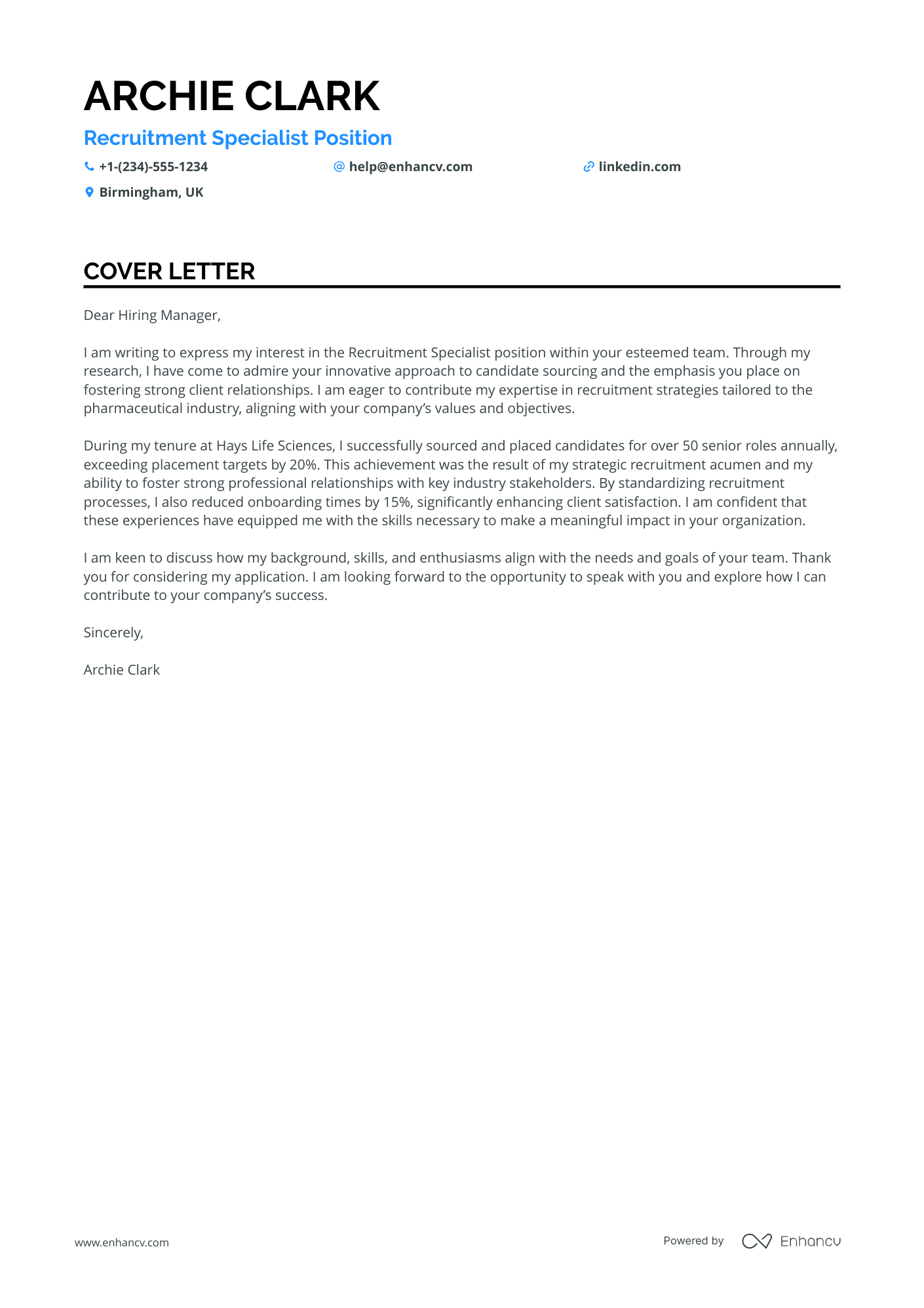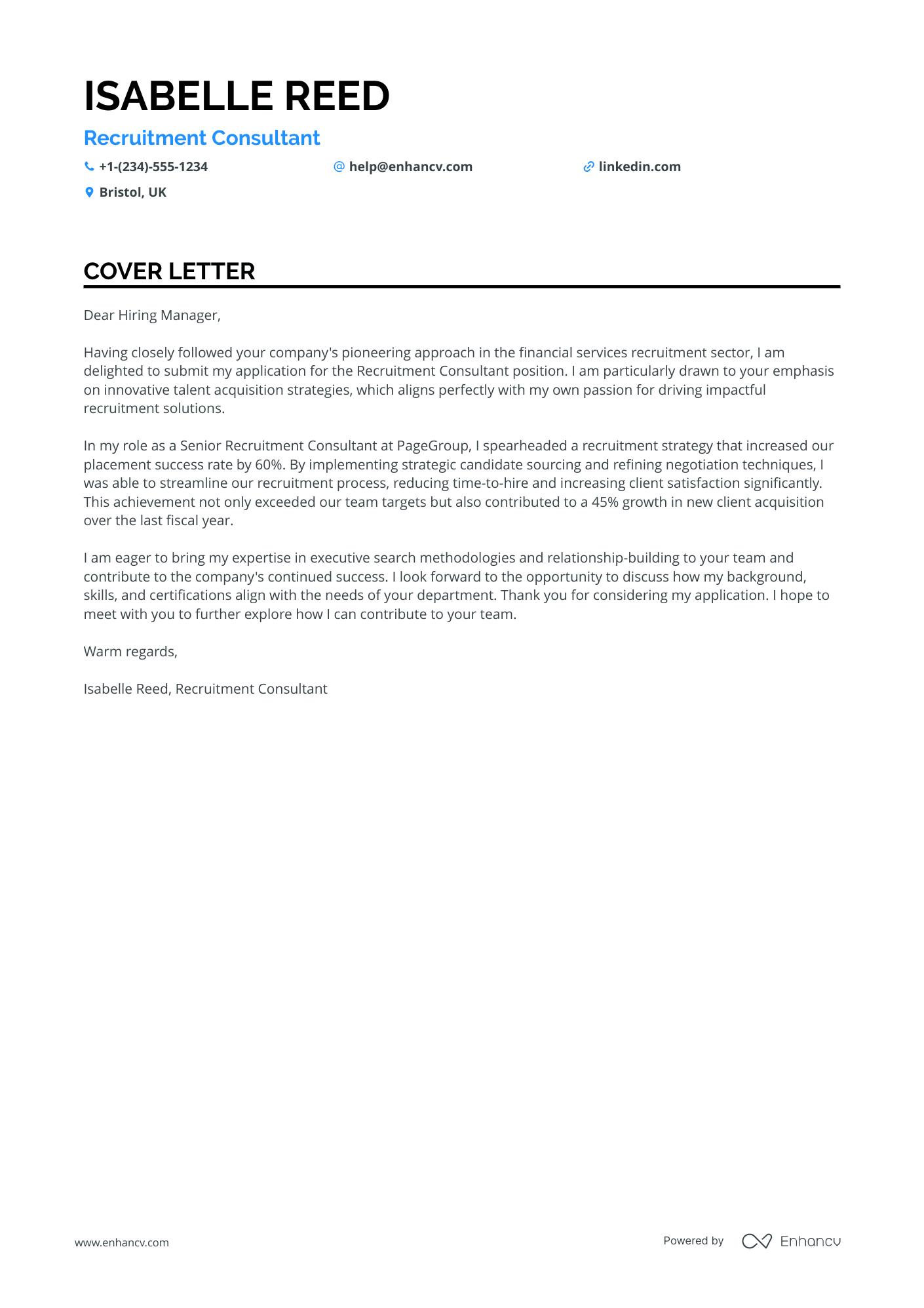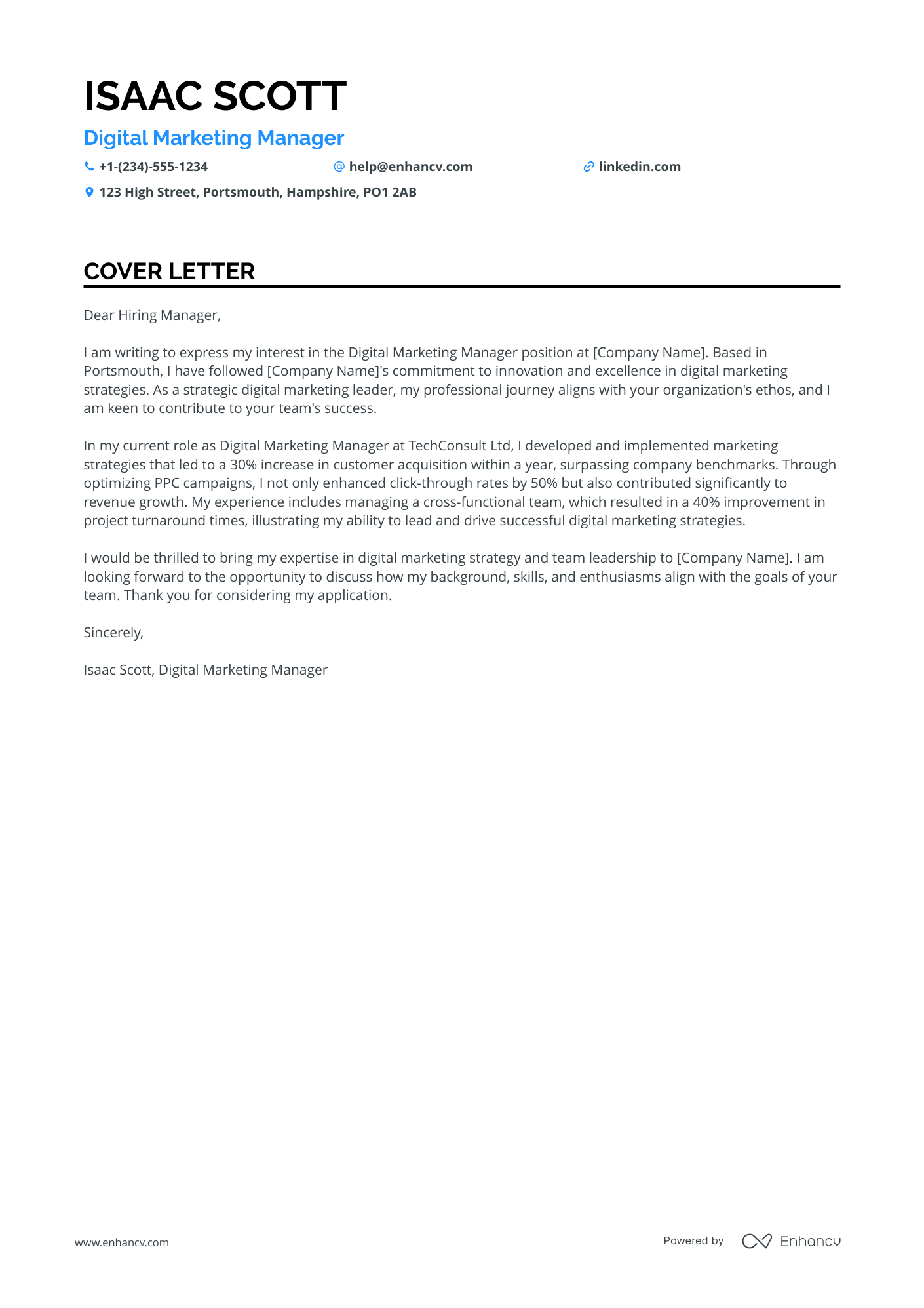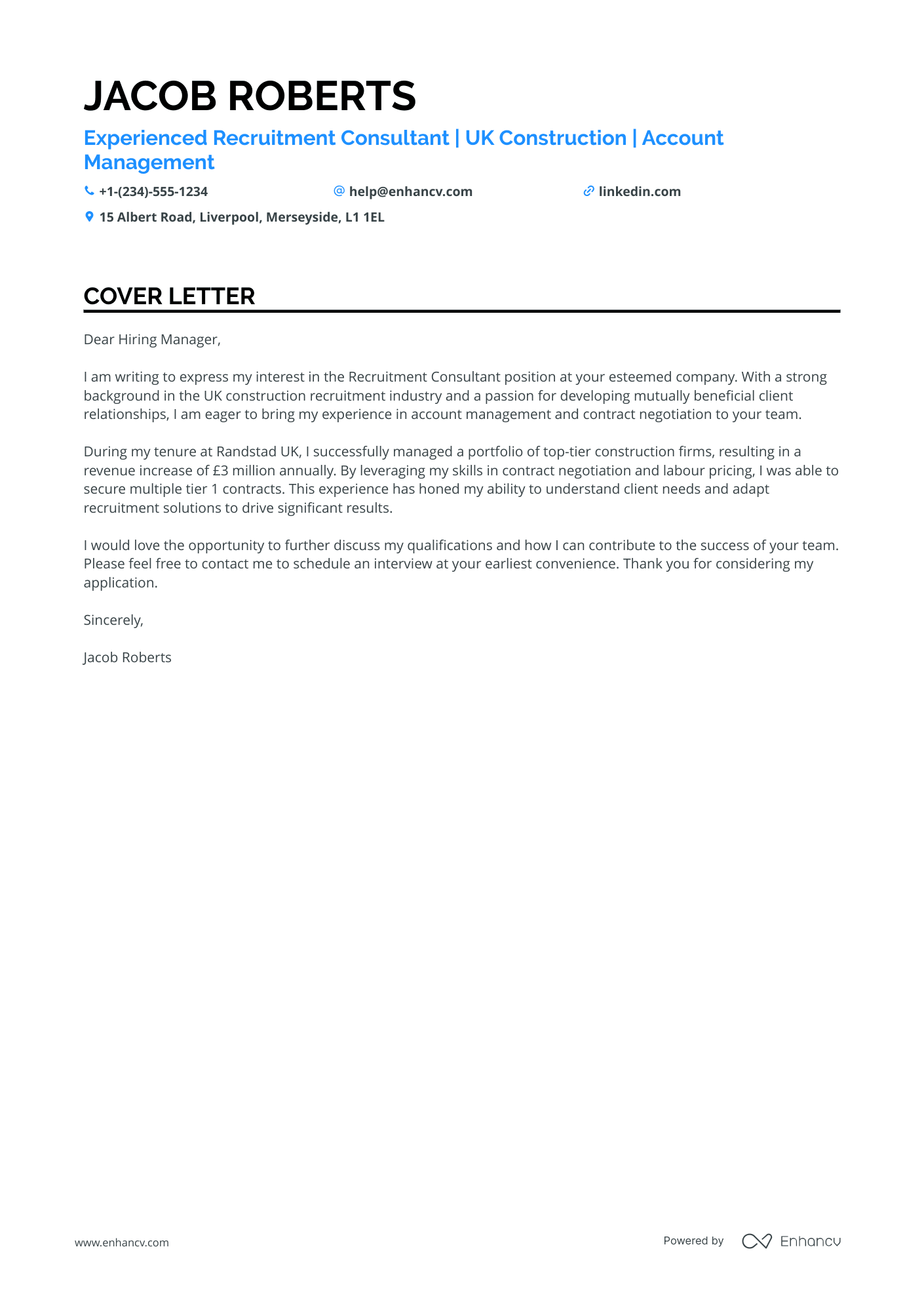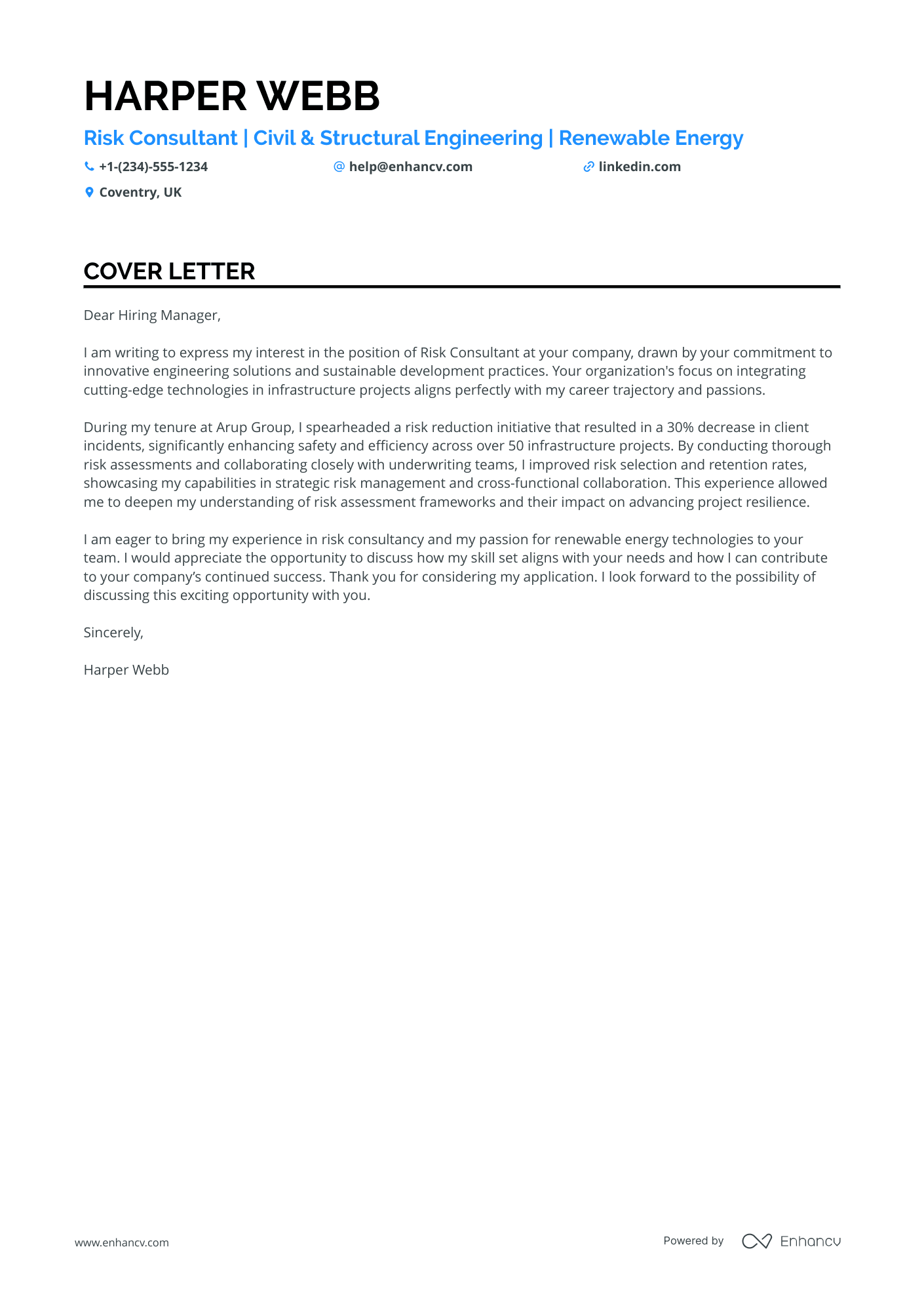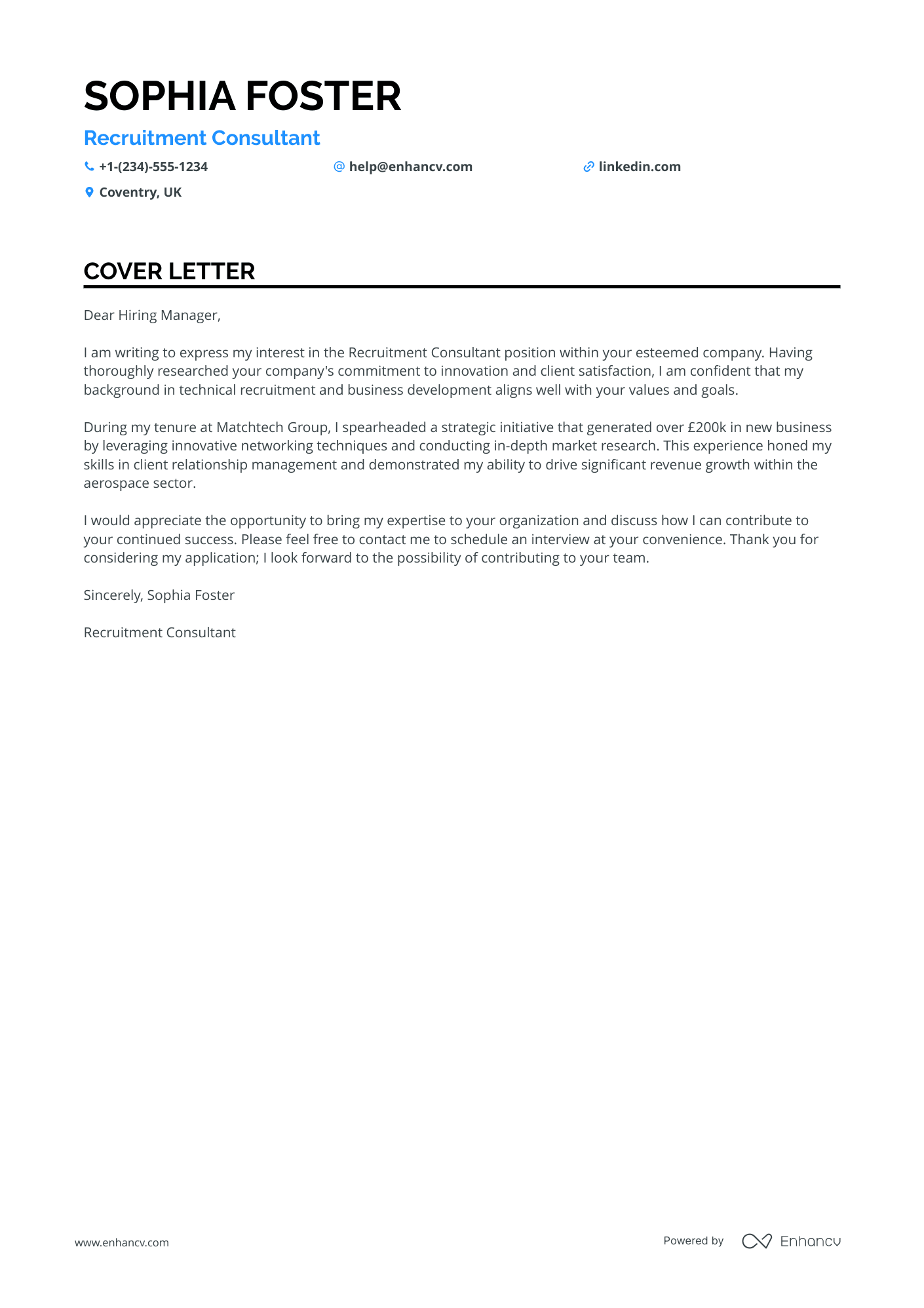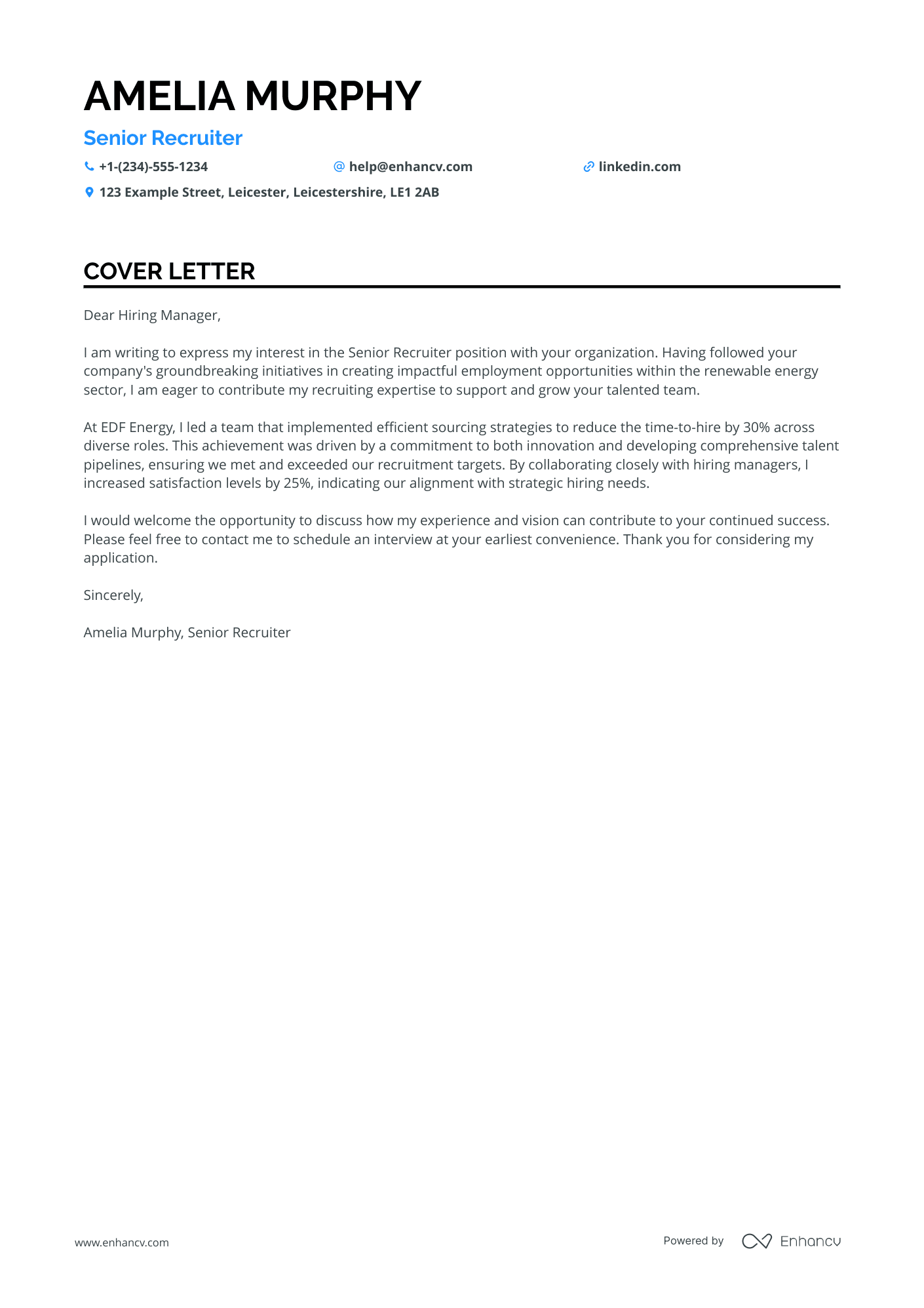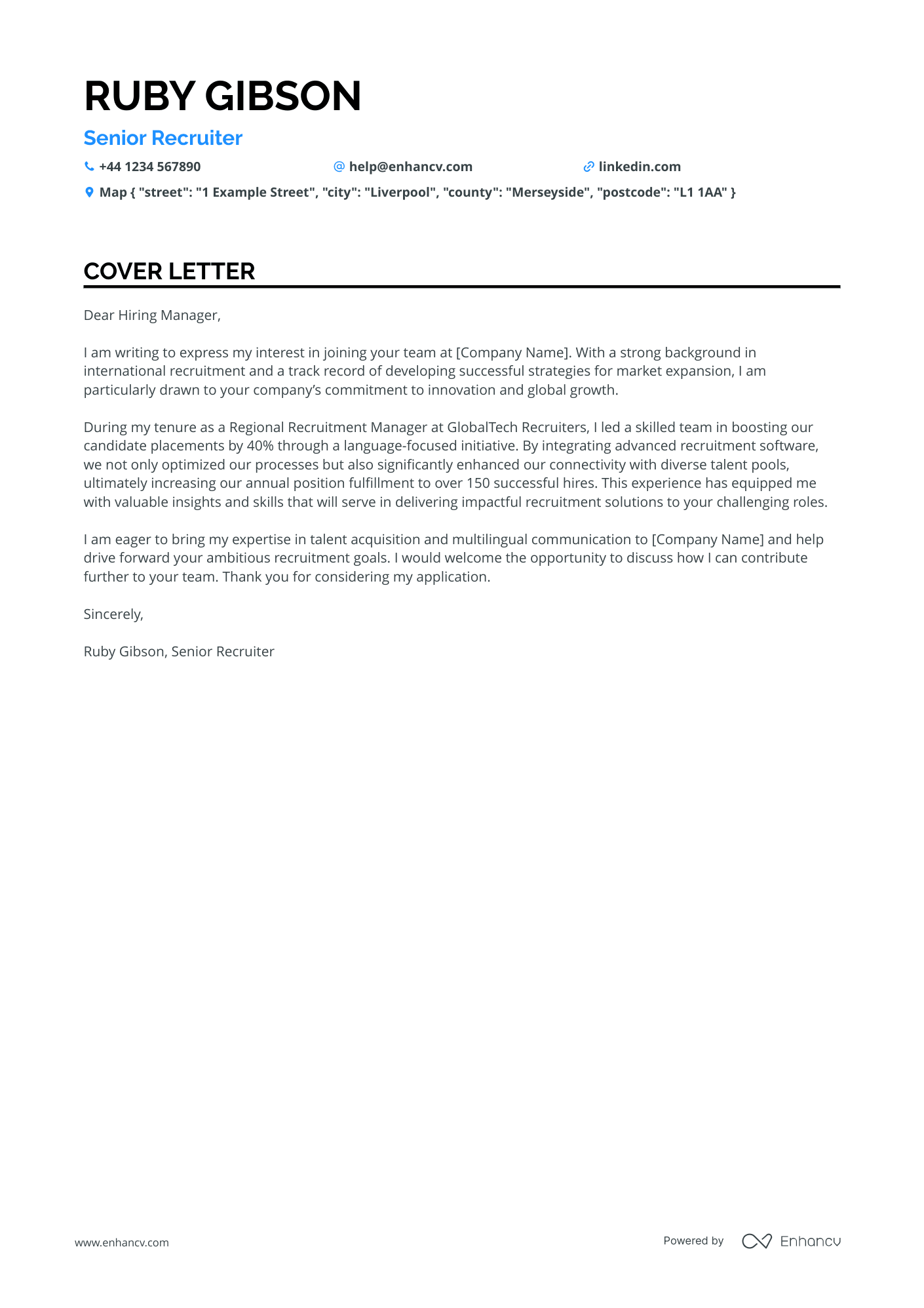Congratulations on completing your first cover letter. However, as you look back, you realise it’s simply a copy-paste of your CV.
Repeating your curriculum vitae is a common pitfall that many candidates encounter, making the cover letter redundant.
Your cover letter should provide fresh insights, adding more value to your application. It’s also the ideal space to address career gaps or major transitions that might not be covered in your CV.
In this guide, you’ll learn how to use your cover letter to demonstrate why you’re the best candidate for the role, while confidently addressing your career history and key achievements.
Cover letter examples for recruitment consultant
By Experience
Entry-Level Recruitment Consultant in Finance
- Highlight Specific Achievements: The cover letter effectively emphasises significant accomplishments, such as increasing placement rates by 30% and enhancing candidate satisfaction scores by 35%, which illustrates the candidate’s impact and potential value to an employer.
- Utilise Relevant Certifications: Including the "Certificate in Recruitment Practice" by the Recruitment & Employment Confederation indicates the candidate's commitment to industry best practices and compliance, adding credibility to their expertise in recruitment.
- Demonstrate Specialised Skills: The mention of advanced skills like project management, streamlined recruitment processes, and efficient CRM system implementation showcases capabilities that are crucial for a recruitment consultant role.
- Show Passion Aligned with Role: Expressing a passion for public sector staffing and dedication to enhancing recruitment strategies for this area highlights the candidate's alignment with potential employers focusing on government or public sector recruitment.
Graduate Recruitment Consultant in Education
- Highlighting measurable achievements: Florence demonstrates quantifiable success in her roles, such as increasing placement rates and improving team performance, showcasing her effectiveness and impact as a Recruitment Advisor.
- Illustrating leadership and mentorship capabilities: By coaching new recruiters and leading projects to integrate new tools, Florence's ability to inspire and guide her team is well-depicted, crucial for a role in talent acquisition and recruitment.
- Emphasising continuous learning and development: The inclusion of relevant courses and certifications, like "Advanced Recruitment Strategies" and "Effective Communication in Business," underlines her commitment to professional growth which is essential in a dynamic field like recruitment.
- Showcasing strong relationship management skills: Her proven success in building networks and improving client satisfaction is vital for recruitment roles where establishing and maintaining relationships is key to success.
Trainee Recruitment Consultant in IT
- Highlight Specific Sector Expertise: Emphasise your knowledge of the engineering sector by mentioning the developed extensive knowledge while working at Hays Recruitment, positioning yourself as a key expert for this niche recruitment role.
- Emphasise Certifications: Mention the "Recruitment Specialist Certification" awarded by the Recruitment and Employment Confederation, illustrating your proficiency in advanced recruitment strategies which align with the specialised nature of the role.
- Volume of Sales and Relationship Management: Bring attention to your ability to achieve 150% of sales targets and manage 30+ client accounts, showcasing your competence in both recruitment and sales effectiveness which are crucial for the role.
- Achievement of Results Through Leadership: Point out your experience in training junior consultants, like at Hays where you contributed to a 35% increase in team growth, reflecting your leadership capabilities and mentoring potential valuable in a recruitment specialist role.
Junior Recruitment Consultant in Construction
- Highlight leadership roles such as "Senior Architectural Engineer" and "Architectural Project Manager," demonstrating capability in managing large-scale projects efficiently.
- Emphasise sustainability achievements, like implementing a comprehensive sustainability programme that increased energy efficiency, appealing to firms prioritising eco-friendly practices.
- Detail the ability to spearhead innovative project executions, such as the use of smart building technology and advanced architectural software, showcasing competence in modern design methodologies.
- Underscore industry recognition and awards, such as being named 'Architect of the Year,' to enhance credibility and display expertise in the architectural sector.
Graduate Recruitment Consultant in Human Resources
- Emphasising Quantifiable Achievements: Highlighting the reduction of onboarding time by 30% and the improvement of workplace satisfaction by 20% demonstrates a significant impact through previous roles.
- Specific Experience Descriptions: Detailing the implementation of HRIS solutions and coordination of policy workshops reinforces expertise in vital HR functions such as process improvement and employee engagement.
- Relevant Certifications: Noting the CIPD certification in Employee Relations and Investigation Skills underscores a commitment to professional development and expertise in handling complex employee issues.
- Passion for Technology: Mentioning a fascination with tech innovations shows alignment with modern HR practices and the potential to drive digital transformation in HR processes.
Entry-Level Recruitment Consultant in Real Estate
- Quantifiable Achievements: Demonstrates impact through specific numbers, such as achieving 150% of sales targets and increasing client base by 20%, essential for proving effectiveness in a sales-driven role.
- Leadership and Team Management: Highlights experience leading a team, which indicates potential for managing larger teams or more responsibilities in future roles.
- Education and Continuous Learning: Emphasises a strong educational background in Real Estate Management and Business Management, complemented by continued learning through specialised courses.
- Client Satisfaction: Mentions maintaining a 100% client satisfaction rate and achieving recognition for excellence in client services, critical for roles centred on client relations and negotiation.
Junior Recruitment Consultant in Energy Sector
- Emphasise specific industry experience, such as the 2 years of sales experience in solar systems, to align with the role of a Jr. Energy Consultant.
- Highlight tangible achievements, such as boosting sales by 30%, to demonstrate the ability to exceed company goals and objectives.
- Include certifications relevant to the field, like the Solar Energy Systems Certification, to showcase specialised knowledge and commitment to professional development.
- Underscore proficiency in industry-standard tools and skills, such as CRM software and lead conversion strategies, which are essential for sustaining productivity in the consulting role.
By Role
Senior Recruitment Consultant in Technology
- Highlighting specialised knowledge: The cover letter effectively showcases the candidate's expertise in Cleantech and Greentech recruitment, which is crucial for understanding the specific needs of clients in these sectors.
- Demonstrating quantifiable success: By including statistics and percentage increases related to client satisfaction, client base, and revenue growth, the candidate provides concrete evidence of their impact and success in previous roles.
- Emphasising continuous improvement: The cover letter mentions the candidate's involvement in strategic projects such as CRM implementation and industry research, illustrating their commitment to improving operational efficiency and staying informed of market trends.
- Showcasing leadership and mentoring capabilities: Highlighting the mentoring of junior consultants and leadership roles in expanding recruitment services demonstrates strong leadership skills, an important quality for a Principal Recruitment Consultant.
Recruitment Consultant for Healthcare Professionals
- Highlighting expertise in candidate sourcing and compliance management, crucial for a Complex Care Recruitment Consultant role, showcases the candidate's ability to meet the industry's staffing and regulatory demands.
- Emphasising quantitative achievements such as increasing candidate satisfaction by 25% and boosting client base by 40% underlines the candidate’s impact and provides measurable results of their work.
- Detailed mention of advanced courses and certifications, like Advanced Recruitment Techniques and Healthcare Regulatory Compliance, adds specialised credibility, showcasing both commitment and expertise in essential industry skills.
- Including a passion for promoting mental health awareness demonstrates the candidate’s alignment with healthcare values and can enhance engagement and rapport with clients and candidates in the sector.
Executive Recruitment Consultant in Legal Sector
- Emphasising the candidate's ability to significantly improve client satisfaction rates and reduce hiring times, showcasing effectiveness in the recruitment process.
- Highlighting the development of bespoke tools and innovative CRM strategies, demonstrating strong problem-solving skills and technical proficiency.
- Showcasing successful revenue growth and client relationship management, underlining strong business development and negotiation capabilities in a competitive market.
- Mentioning relevant courses and industry-specific knowledge, such as "Legal Sector Recruitment Insights," to underline specialised recruitment expertise and commitment to staying updated in the field.
Recruitment Consultant for Engineering Positions
- Experience Alignment: The cover letter effectively ties Florence Knight's current and previous roles in water engineering to measurable project outcomes, such as reducing flood risk and improving environmental sustainability, making it highly relevant for roles focused on water management and climate resilience.
- Skills and Certifications: Florence highlights specialised skills and courses, such as Advanced Hydraulic Modelling and Sustainable Water Management Strategies, essential for roles demanding expertise in hydrology and digital tools.
- Quantifiable Achievements: The letter emphasises specific achievements with quantifiable results, such as increasing project efficiency by 20% and client satisfaction by 35%, which are persuasive indicators of Florence's ability to deliver impactful results.
- Passions: Including passions such as 'Innovation in Engineering' and 'Environmental Sustainability' helps demonstrate Florence's personal motivation and alignment with potential employers' sustainability goals and innovation agendas.
Senior Recruitment Consultant in Retail
- Emphasise measurable results: Poppy consistently highlights quantifiable achievements, such as a 20% sales increase in client consultation and store operations, making her accomplishments more tangible and persuasive.
- Highlight relevant certifications: The Professional Skincare Consultation certification from the Cosmetics Training Academy underscores her expertise in skincare consultations and distinguishes her in the retail sector specialising in personal care.
- Showcase leadership skills: Demonstrating leadership through successful team management and improving store performance by creating training programs and increasing employee satisfaction underlines her qualifications for a Senior Retail Consultant role.
- Align with company goals: Poppy illustrates her ability to work collaboratively with store managers to align store operations with strategic objectives, ensuring her compatibility with organisational goals and KPIs.
Recruitment Consultant for Hospitality Industry
- Highlighting Industry-Specific Experience: Emphasise your extensive experience in the hospitality industry by detailing achievements like improving placement efficiency and increasing client satisfaction. This demonstrates your specialisation and expertise in this sector.
- Demonstrating Relationship Building Skills: Showcase your ability to develop strong client relationships and networks, as evidenced by repeat business and client satisfaction improvements. This skill is crucial for a recruitment consultant where collaboration and client trust are paramount.
- Leadership and Team Management: Highlight your leadership role in managing a team of consultants, driving significant revenue growth. This portrays you as a capable leader who can drive team performance while achieving business objectives.
- Innovative Recruitment Strategies: Point out your strategic initiatives in enhancing recruitment processes, such as implementing digital campaigns or enhancing candidate pools. This reflects your ability to adapt and innovate in a dynamic recruitment landscape.
Recruitment Consultant for Pharmaceutical Sector
- Highlighting specific achievements, such as the "Top Recruitment Consultant Award" or successfully implementing an "Innovative Sourcing Strategy", which demonstrate a tangible impact and expertise in the role.
- Emphasising industry-specific skills, such as "candidate sourcing", "market research", and "strategic recruitment", which align with the specialised requirements of recruitment within the pharmaceutical sector.
- Mentioning relevant certifications, like the "Pharmaceutical Recruitment Certification", adds credibility to the candidate's proficiency in life sciences recruitment.
- Showcasing a strong educational background with a "Master of Science in Human Resource Management" enhances the candidate's qualifications and knowledge in recruitment practices.
Executive Recruitment Consultant in Banking
- Highlighting certifications such as the "Financial Services Headhunting Certification" and "Advanced Executive Search Strategies" is crucial for showcasing expertise in specialised recruitment areas, especially within financial services.
- Detailing specific accomplishments, like achieving a 60% increase in placement success and leading a team to consistent target achievement, demonstrates leadership and impactful contributions to company goals.
- Emphasising relationship-building skills and C-suite executive engagement showcases an ability to maintain and grow important client relationships, crucial in recruitment consultancy for private markets.
- Including language proficiency in both English and French can be advantageous for roles involving multinational client engagement, suggesting added value in communication and cultural understanding.
Recruitment Consultant for Digital Marketing Roles
- Emphasises a significant achievement in customer acquisition, showcasing impact and aligning with the desired capabilities of a Digital Marketing Manager role.
- Highlights strategic planning skills through a demonstrated history of performance-based campaigns, which is crucial for directing effective marketing strategies.
- Illustrates strong leadership and team management through experience managing cross-functional teams, enhancing collaboration and efficiency.
- Mentions advanced courses in digital marketing and SEO specialisation, reinforcing the applicant’s ongoing professional development and expertise in the field.
Senior Recruitment Consultant in Logistics
- Emphasising Industry-Specific Experience: Jacob highlights over seven years of experience in UK construction recruitment, showcasing industry expertise crucial for a recruitment consultant role.
- Quantifiable Achievements: The cover letter effectively uses figures, such as a 30% increase in revenue and a 12% improvement in margins, to demonstrate the tangible impact of Jacob's work, making the accomplishments credible and compelling.
- Core Skills and Certifications: By listing certifications like 'Advanced Negotiation Techniques' and 'Certified Recruitment Professional', Jacob not only underlines specialised skills but also a commitment to professional development.
- Client Relationship Management: The letter underscores a passion for building strong client relationships, a pivotal aspect for success in recruitment consultancy, backed by evidence of improved client retention rates and satisfaction scores.
Recruitment Consultant for Manufacturing Positions
- Specific Industry Experience: The cover letter clearly outlines Harper Webb's extensive experience in risk consultancy and structural engineering within the construction and heavy manufacturing industries, showcasing credibility for the Risk Consultant role.
- Emphasis on Achievements: The letter highlights measurable outcomes, such as a 30% reduction in client incidents and reduction in design processing times, which demonstrates a strong focus on accomplishments and results-driven work.
- Focus on Innovation: Harper Webb's passion for renewable energy technologies and implementation of low carbon materials and advanced software reflect a commitment to innovation and sustainability—key interests likely valued by employers in the engineering sector.
- Educational Background: Mentioning advanced degrees in Structural and Civil Engineering supports the specialised education necessary for a role demanding technical expertise and problem-solving skills.
Recruitment Consultant for Aerospace Industry
- Highlight Relevant Experience: The cover letter effectively outlines Sophia's specific achievements and contributions within her roles in the recruitment sector, particularly noting the successful acquisition of significant aerospace clients and the expansion of market share. This focuses on her proven track record in the domain.
- Certifications and Education: Mentioning specialised courses like "Advanced Recruitment Techniques" and "Client Relationship Strategies in Engineering" showcases her commitment to ongoing professional development, reinforcing her specialised skill-set relevant to the recruitment industry.
- Quantifiable Achievements: Including measurable accomplishments, such as generating over £200k in new business and increasing candidate placements by 50%, provides concrete evidence of her effectiveness and success in the recruitment field.
- Skills and Areas of Passion: Detailing skills like 'Business Development' and interests like 'Aerospace Innovations' helps align her personal interests and professional capabilities with the specific needs and focus areas of potential employers in the engineering and aerospace sectors.
Executive Recruitment Consultant in Telecommunications
- Highlighting key achievements with specific metrics such as a 30% reduction in time-to-hire and 40% increase in internship applications showcases effectiveness and capability in recruitment roles.
- Emphasising relevant experience in full lifecycle recruiting and process improvements that delivered cost savings and increased hiring manager satisfaction adds significant credibility.
- Including industry-specific certifications like the Talent Acquisition Certification and courses like Advanced Recruitment Strategies demonstrates commitment to continuous professional development and enhances expertise.
- Showcasing partnership building skills, such as collaborating with HR business partners and developing strategic university partnerships, aligns with the expectations of a senior recruitment role.
Recruitment Consultant cover letter example
Ruby Gibson
[object Object]
+44 1234 567890
help@enhancv.com
- Quantifiable Achievements: Highlighting a concrete achievement, such as boosting candidate placements by 40%, underscores the applicant’s capability and provides tangible evidence of success that potential employers can easily grasp.
- Relevant Experience: Mentioning specific past experience in a similar role, like leading a regional recruitment team and integrating advanced recruitment software, directly aligns the candidate's skills with the needs of a senior recruiter position.
- Industry-Specific Language: Utilizing terms like "market expansion" and "multilingual communication" demonstrates familiarity with the recruitment field's specific demands, enhancing the applicant’s credibility and expertise.
- Company Alignment: Expressing admiration for the company’s commitment to innovation and global growth shows that the candidate has researched the company and shares its values, making them a potentially good cultural fit.
Importance of cover letters in the United Kingdom
A well-crafted cover letter can significantly strengthen your job application by emphasising why you’re an ideal fit.
Here are some reasons why it matters:
- Personalisation: Employers expect your cover letter to demonstrate how your skills and experience align with the company’s needs and/or values.
- Addresses what is omitted from your CV: If your career path includes gaps or changes, your cover letter is the best place to address these positively and explain their relevance.
- Opportunity to stand out: Many applicants have similar qualifications, so a tailored cover letter can show your unique attributes and experience.
What UK employers expect from a cover letter
Your UK employers will appreciate your application if you've taken the effort to tailor your cover letter to their job requirements.
Here’s how to ensure yours ticks all the right boxes:
- Research the company thoroughly: It's not enough to have only read the job advert. Look into the company's history, products, services, and recent achievements to demonstrate your genuine interest and knowledge.
- Connect with the company’s values: Every company has core principles that shape its culture and operations. Identify these values and use your cover letter to show how they align with your professional conduct and ethics.
- Emphasise your relevant skills: Highlight specific skills that match the job description and are most in demand. Use examples from your previous experience to support your claims and set yourself apart from other candidates.
How to format a recruitment consultant cover letter
Have you ever wondered about the formatting and structure of your cover letter?
Read on to discover some guidance from industry-leading professionals:
- Within the header, include your address and contact details, the employer's name and address, and the date, followed up by a personalised salutation.
- The body should should consist of an opening paragraph, middle paragraphs expanding on your unique experience and skills, and a closing paragraph.
- End with a formal sign-off and your signature.
- Choose modern fonts such as Volkhov, Chivo, or Bitter instead of the more traditional Arial or Times New Roman.
- All of ENhancv's templates maintain single-spacing with approximately 1-inch (2.5 cm) margins on all sides to ensure a neat presentation.
- Always send your cover letter as a PDF to keep the formatting intact and prevent any edits once submitted.
Your CV and cover letter maintain consistent formatting. Use the same fonts, margins, and style to create a professional and cohesive look for your application.
Finally, remember that Applicant Tracking Systems (the software some companies use to align job keywords to your experience, also known as ATS) do not read cover letters–it's intended solely for recruiters. Make it stand out by highlighting your achievements and relevant skills for the role.
How to write your recruitment consultant cover letter salutation
Imagine you're a hiring manager reading through countless cover letters—which would catch your attention: being addressed directly by name, or reading 'Dear Sir or Madam'?
The first option shows you've made the effort to learn about the company and the role.
To find the hiring manager's name, try LinkedIn, check the company's website, or even reach out to the organisation on social media.
How to write your recruitment consultant cover letter intro
A great option to begin your cover letter is by showing recruiters you've done your homework or research.
If the company has won an award or made headlines, congratulate them in your opening sentence, or express how impressed you are.
Provide this achievement as a reason why you admire the company, ensuring your tone remains genuine, sincere, and authentic.
How to write your recruitment consultant cover letter body
Which makes for a stronger cover letter body: a long-winded account of everything you’ve ever done, or a focused achievement that’s directly relevant to the job?
Hint: recruiters prefer the second.
When writing your cover letter, select your most impressive achievement that:
- Directly aligns with the job description and role.
- Is quantifiable with tangible metrics like numbers or percentages.
- Maps out your hard and soft skills, showcasing what makes you unique.
- Tells the story of the impact you could have on the organisation.
How to write a closing paragraph
When ending your cover letter, you have two options:
Option one is to promise how you’d contribute to the organisation—whether that’s improving a target or achieving a specific goal—or how the company could help you grow professionally. Always emphasise the tangible impact you can deliver.
The second option is to close by asking when you can expect to hear back from the hiring managers, whether for an update or to arrange an interview.
Conclusion
Crafting an engaging cover letter can significantly enhance the effectiveness of your job application. Always personalise your letter by addressing the hiring manager directly and linking your qualifications to the role's requirements.
Highlight relevant achievements that set you apart and demonstrate your enthusiasm for the company. Maintain a professional format that complements your CV, creating a cohesive and polished application.
